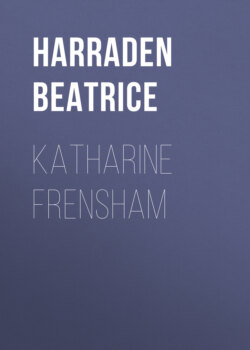Читать книгу Katharine Frensham - Harraden Beatrice - Страница 4
На сайте Литреса книга снята с продажи.
CHAPTER I.
ОглавлениеTable of Contents
"Do you understand, Alan, my boy?" asked Clifford Thornton.
"No, father, I don't," the boy said in a low voice. "It seems all such a fuss about nothing. Why can't you and mother have it out like any other fellows, and then make it up and be friends? You can't think how easy it is."
"We have been doing that for fifteen years and more—all your lifetime," the man said.
"I never knew it was as bad as that," Alan said.
"We tried to spare you the full knowledge of it," the man answered gently. "But now that you are old enough to know, we are obliged to tell you that we are not, never have been, happy together, and that we do not wish to be together. We spoil each other's lives."
Alan was sitting on the sofa. He stirred a little, and then suddenly, without any warning, burst into tears. Although he admired his mother's personality and bearing, he had never been particularly attached to her; but with that conservative conventionalism characteristic of an English boy, he was mortified, and felt it to be a disgrace that there should be any serious disagreement between his parents.
Clifford Thornton looked at the boy whom he loved and whom he had wounded; and he recognised with a sharp pain of regret that Alan was still too young and too sensitive for the news which had been broken to him. Bitterly the man reproached himself for his selfishness. And yet he had waited for this moment for fifteen long years—more than that; for he and his wife had discovered at the onset that they were out of sympathy, each having an aura hostile to the other. Then the child had come, and these two naturally antipathetic people had thought: "We shall draw nearer to each other because of the child."
But Nature is merciless in many of her ways, and mysterious; and perhaps her greatest and subtlest human mystery is the strife, conscious or unconscious, of one individuality with another individuality. And she gives no balm for it. On the contrary, she gives a sort of morbid remorse, wholly out of proportion to the quality and quantity of mistakes and failings born necessarily of unsuitable companionship.
Clifford Thornton bent over him and put his hand on the lad's shoulder.
"Alan," he said, almost imploringly. "Don't fret like that. We will talk about it another time. Come, pull yourself together. We will go for a ride, and you can try the new cob."
The boy sobbed on as though he had not heard.
"Alan," Clifford Thornton said.
The boy looked up, and stifled his last sob.
"I don't want to go riding," he said. "I want to go and be alone."
He rose from the sofa and dried his eyes. He did not seem ashamed of his tears; he offered no excuses for his sudden outburst of grief.
"I'm awfully upset, father," he said with trembling voice.
"I have done you an injury to-day," his father said, "and I can never forgive myself. I have taken away from you something which I can never give back—that splendid belief of childhood that everything is going on all right."
Alan did not seem to hear. He took his cap from the writing-table and turned towards the door. It was evident that he wanted to say something to his father, but that the words would not come. He opened the door slowly and passed out. Clifford Thornton watched him, and watched the door close, and then stood still a moment, waiting, longing, and listening. But when he realised that the boy had indeed gone, he slipped into his study chair and leaned back, his arms folded tightly together, and his thin face drawn into an expression of great pain. The thoughts which passed through his mind kept him chained there, as one paralysed. Not a muscle of his face moved. He might have been a dead man staring at nothing. At last, perhaps half an hour afterwards, the door opened, and Alan came back.
"Father," he said shyly. "It's all right now. Let us go riding, after all."
The strain on the man's face relaxed. Father and son clasped hands.
